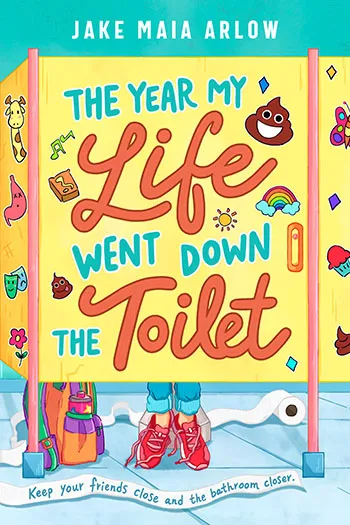When author Jake Arlow was in middle school, they were diagnosed with Crohn's disease, a chronic illness affecting how one goes to the bathroom. As a young kid learning how to navigate the world around them, Arlow often felt embarrassed about their disease. Now, 15 years later, a lot has changed.

Writing an aspirational world
Today, Arlow is a successful middle-school novelist, and they see Crohn's disease as just another facet of their identity, no different than being Jewish or Queer. They're also getting ready to release their third book, The Year My Life Went Down the Toilet, a story about a Queer middle schooler who, like Arlow, is diagnosed with Crohn's.
"It was a challenge ... to put all those aspects of my own identity that I share into a book and to show both myself and people reading that people are like this, [that] it's not too much to have all these things going on," Arlow said. "I wanted to write a book where a main character is diagnosed with Crohn's disease in middle school, because that's when I was diagnosed."
Arlow enjoys writing stories about middle schoolers because the awkward self-awareness is fodder for drama. "It is such a fertile ground to talk about body issues and self-esteem in middle school," they explained, "because that is already on every kid's mind, and to add to that, a chronic illness that deals with the bathroom compounds all those emotions."
"I just love writing books where kids get to experience the full depth of their kid emotions," they added. "I can still so distinctly remember back to middle school and high school, where everything felt so huge and every emotion felt life-altering. That's such a fun thing to write, because it increases the stakes. That is how kids feel, [so] getting to write from that perspective – that every moment of my day is a new, huge, terrible thing – is just so fun."
Arlow likes to draw from some of their experiences when writing but also builds a world they wish they had as a child for the characters. "I wanted to write a utopian idea of what it could have been like in middle school with a chronic illness," they said. "The parts [of my life] that I did draw from are parts where she has bathroom emergencies. I drew from my most embarrassing stories, but... I wanted to give [Al, the main character] a better experience with her diagnosis and a more supportive experience to show that it is possible and there are communities like that. But the parts I drew from [my experience] were the mortifying parts of it."

Representing chronic illness
While Al is Queer, like Arlow, the character discovers and embraces her identity much earlier than Arlow did.
"I didn't realize I was Queer until I was much older, until I was in college," they said. "Here, it's a lot more aspirational."
Throughout the book, Al discovers the rich community around her and finds other LGBTQ+ people and those with chronic illnesses to connect with. "She's able to express it more and has a lot of Queer community, and that's another thing I didn't have in middle school but ...would have loved to have had. So I didn't draw on my own experiences, or if I did, they were experiences I had later in my life. I ...wanted to show a supportive environment for a Queer middle schooler."
Part of Arlow's motivation to give their character a more supportive and encouraging environment than they actually had is due to the way societal perception of both queerness and chronic illness has changed since they were in school. Even the way young people are diagnosed with conditions like Crohn's disease is different.
"Diagnosis has changed since I was a kid. Medicine changes so quickly. Even since I was a kid, diagnosis has become much more humane and advanced than it was 15 years ago, when I was diagnosed," Arlow explained. "I wanted to make sure [the book] was accurate to what a kid getting diagnosed today would go through."
Al's experience with Crohn's is similar to Arlow's, but the author knows that no two people experience the illness the same way. It was important to them to include other kinds of Crohn's patients as well.
"[Another] member of the support group [Al] is a part of has an ostomy bag, which is not something I have," Arlow said, "but I have had a lot of friends who have them, and also the YouTuber Hannah Witton has one... I love her. She has a lot of videos about ostomy bags, so I definitely pulled from her in my research. I thanked her in my acknowledgments. I pulled from both lived experience and also research."
Writing a story about a kid with Crohn's disease was something Arlow had wanted to do for a long time. It was a story they would have loved to have read as a kid, and they know there are young people out there who will see a part of themselves portrayed on the page for the first time.
Arlow first got the idea to write The Year My Life Went Down the Toilet in 2019 while browsing one of the most iconic bookstores in the Pacific Northwest. "I was in Powell's in Portland, and I was like, 'I should write a book about a kid with Crohn's.' Then it took me a while until I actually was ready to start drafting."
The pandemic led to a lot of creative burnout for Arlow, who put off writing the story for months. Unlike their last two published novels, they felt pressure when representing a community that isn't often the subject of fiction.
"This is my first book where a character has a chronic illness, and I wanted to make sure I was portraying it authentically, even though I also live with this disease," they explained. "I think there was a lot of pressure to ensure that I am representing the experience accurately, so I wanted to take my time."
Finding community in unlikely places
Arlow hopes their latest book gives kids confidence, especially those with chronic illnesses. "I want them to know that every part of themselves is both important and intrinsic, worth loving and worth sharing," they said. "Al has these intersecting identities that lead to a lot of embarrassment, but it's also the reason she finds community in her support group and the way she relates to other Queer kids, and she finds a lot of community in her Jewish identity."
Overall, The Year My Life Went Down the Toilet is about finding community in unlikely places. "I want people to understand, yes, a chronic illness can be a really taxing experience, but it's also something you can find community from," Arlow said.
While it may not have happened for Arlow in middle school, they eventually found a supportive community around Crohn's. "I just got back from volunteering at a Crohn's camp I went to as a kid, and that was such a healing experience of having that community who understands what you're going through. I want kids to know that every part of themselves is worth loving and that they can find joy and community through parts of them that they see as struggles as well."
The Year My Life Went Down the Toilet is available this August. Fans of Arlow can also check out their previous novels, Almost Flying and How to Excavate a Heart.


